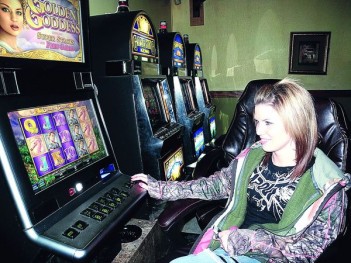
Chelsea Carr plays the Golden Goddess Limited Video Lottery game at Undo’s in Benwood.
WHEELING, W.Va. — Citing the need to increase revenue in the face of escalating costs, members of the West Virginia Amusement & Limited Video Lottery Association want the right to operate seven slot machines at each outlet instead of just five.
State Senate Minority Leader Jeff Kessler, D-Marshall, believes the operators have a point, so he introduced that is now slated for review by the Senate Judiciary Committee.
“The numbers we picked in the early 2000s were just arbitrary numbers,” Kessler said of the 2001 Limited Video Lottery Act that established the limit of five machines per outlet. “Some clubs may have five machines and don’t have room for all their customers. Some clubs may have five machines, but only two or three get played.”
Anthony “Herk” Sparachane is both president of the LVL association and co-owner of Wheeling Coin LLC, which operates 375 of the 7,137 machines now running across the Mountain State.
“Adding two more machines to prime locations would make the state millions of dollars,” he said. “An estimated 933 machines are in warehouses and the state is not making a penny.”
The 2001 LVL act outlawed the pre-existing “gray machines” found throughout West Virginia at the time. The original 10-year licenses for about 9,000 machines expired in 2011. Operators paid an average of $9,200 in 2011 for new permits to operate each machine. Sparachane said there are roughly 8,070 total machines, but only the 7,137 are running.
The West Virginia Lottery Commission treats limited video lottery machines – found in many local restaurants, bars and fraternal organization establishments – differently than those found at Wheeling Island Hotel-Casino-Racetrack or Mountaineer Casino, Racetrack and Resort. Chief among the differences is the tax rate imposed on the machines, as the state imposes that 52 percent tax rate on limited video lottery but only a 42 percent rate on devices at the tracks.
Unlike fraternal organizations, which are permitted to run 10 machines, clubs and bars are only allowed five at this time.
Profits from video lottery go toward state tourism, education and programs for senior citizens. Excess funds are used to provide college scholarships, including the PROMISE Scholarship, and support economic development bonds.
Sparachane said several operators are struggling to stay open, citing an increase in the state’s minimum wage. He also said the lottery commission only took 33 percent of the revenue in 2001 – when minimum wage was nearly $3 less – opposed to the current 52 percent.
“Failure to pass this bill will start a decline in revenue, which doesn’t make any sense,” Sparachane said. “We had 1,700 retailers at one time. We now have 1,423.”
Kessler said he is not sure how much traction the bill will gain before the Legislature’s session ends March 14.
“This would be a pro-business initiative,” he said.
To read more from The Intelligencer/Wheeling News-Register, subscribe here.




